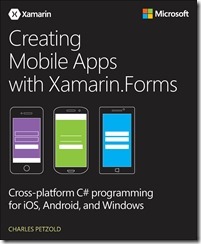Free ebook: Creating Mobile Apps with Xamarin.Forms
 Microsoft Press, in cooperation with Xamarin, is pleased to publish a new ebook by legendary author Charles Petzold: Creating Mobile Apps with Xamarin.Forms: Cross-platform C# programming for iOS, Android, and Windows.
Microsoft Press, in cooperation with Xamarin, is pleased to publish a new ebook by legendary author Charles Petzold: Creating Mobile Apps with Xamarin.Forms: Cross-platform C# programming for iOS, Android, and Windows. 


This is the third version of an ebook about writing applications with Xamarin.Forms, the mobile development platform for iOS, Android, and Windows unveiled by Xamarin in May 2014. (The first two versions of this book were Preview Editions.) Xamarin.Forms lets you write shared user-interface code in C# and XAML (the Extensible Application Markup Language) that maps to native controls on these platforms.
The Windows support of Xamarin.Forms includes the Windows Runtime (WinRT) for targeting Windows 8.1 and Windows Phone 8.1 devices, and the Universal Windows Platform (UWP), which is a form of the Windows Runtime that targets Windows 10 and Windows 10 Mobile devices with a single program.
The two previous versions of this book were called Preview Editions because they were not complete. At 1200 pages, this is the first edition that can claim to be complete, even though several topics are not included and Xamarin.Forms continues to be progressively enhanced with no sign of slowing down.
Who should read this book
This book is for C# programmers who want to write applications using a single code base that targets the three most popular mobile platforms: iOS, Android, and Windows, encompassing the Universal Windows Platform and Windows Phone.
Xamarin.Forms also has applicability for those programmers who eventually want to use C# and the Xamarin.iOS and Xamarin.Android libraries to target the native application programming interfaces (APIs) of these platforms. Xamarin.Forms can be a big help in getting programmers started with these platforms or in constructing a prototype or proof-of-concept application.
This book assumes that you know C# and are familiar with the use of the .NET Framework. However, when Charles discusses some C# and .NET features that might be somewhat exotic or unfamiliar to recent C# programmers, he adopts a somewhat slower pace.